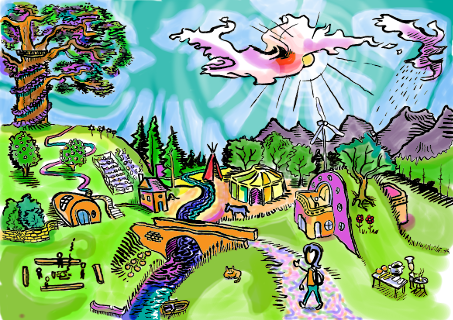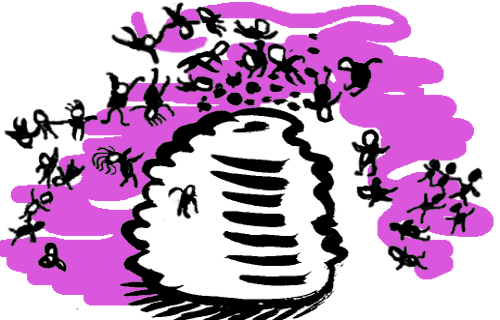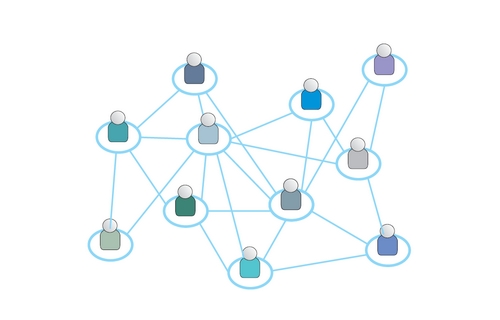The Story Behind Bridgedale360

I just had to leave…
I had been walking aimlessly, as if my body just carried me along, for what seemed like forever. I still didn't know where I was heading or what was propelling me forwards. Except the reverb of that thought - I had to leave - and a name. Bridgedale360. My fist tightened around the scrap of paper on which it was written. I didn't have to open it, again, to see it. By now the name and the X that marked it on the spidery map was already etched into my mind. Instead, I looked up and wondered whether the turn in the road was starting to look - not exactly, but still - like the curve of one of the lines on the map. Like one of the spider´s legs. All roads lead to Bridgedale360? I first heard about it from a friend a few months ago and then later, overheard it in a bar. Just people talking over loud and dull pop - but I heard it for sure - and then I found this map, or it found me. I had to leave, my heart needed to believe, I had to believe.
I picked up the pace, my heart beating out a rhythm for my legs to follow, and my right side stung. Exhaustion and fear tugged at me, and perhaps it was regret that made me look back every now and again, but this time I wasn't going to let it get the better of me. Not this time. I threw some of what was left over from my bag of dried fruits into my mouth, hoping it would hush my hunger. My feet yelled out in pain; my new boots had still not been broken in. Instead, the boots seemed bent on breaking me in. Blisters and all. My insides screamed at me in revolt.
Suddenly I heard voices. I got cautious, a bit afraid, but my curiosity brought me closer. My ears twitched like antennae, trying to figure out where the voices came from. I stood still. There. “Bridgedale360”, I heard it. My heart rattled my ribcage. “Over there, not so far anymore.” I had to get to them. “Wait!” I think I said and cut through the row of trees, hesitantly at first, but then found myself pushing and shoving shrubs aside, until I saw them and they saw me. “Hi,” said the woman, smilingly. I gasped and smiled back and my insides kept quiet, for once.
We were walking for days, mostly quietly. But there was a sense of unity that I had never felt before. We were all following our dreams somehow, but without really knowing what it was. Layla showed me some pictures of her family, and said that she didn’t know any longer where they were, if they were alive. Could we blame the “system crisis”? But I also felt conscience-stricken, because I saw how privileged I was. Yet, I was unhappy. But happiness does not come with abundance, I learnt it the hard way. I could not imagine myself continuing like before. I desperately needed Bridgedale360 to be more than a silly fairy tale…
Once we started off together, everything fell into step so to speak. We moved as if we were one, people from the west, people from the east, just people...fleeing the old system and searching for that unknown place. Conversations bubbled up here and there, naturally without any haste, but then we would retreat into a silence again, as we mulled over things we had just heard, and I imagined how life was for them before in the countries where they were coming from, and how much it sounded like my own in some ways; while in others, mine was completely foreign to theirs. I remembered the things I used to enjoy, but that was in the past, I told myself, as I shook off an all too familiar sense of heaviness. Excess does that to you, somehow. But, here on this dirt road to Bridgedale360, I was just like them. Bridgedale360 was and will be the great equalizer for us all.
Arriving happened by surprise. We came to a stream and a little further up a girl was playing in the water, singing for herself. We came closer and when she saw us she smiled. “Ahoy there, comrades!”, she said. And she smiled and waved at us. I was surprised by the openness with which she was greeting a bunch of strangers. In the middle of nowhere! But it wasn’t in the middle of nowhere, we soon found out. Further up the stream we saw a mill and some mechanism pumping water. And then it all just opened up. Without waiting for us, the girl skipped ahead and we followed, not skipping like her, but feeling a slight hop in our own step. We exchanged glances and before we knew it, buildings and gardens and people working appeared from behind the trees. Everybody stopped to greet if only briefly, and smiled before they got back to doing what they were doing. Cows grazed past us. Even they seemed to smile.
Our little guide, we could see, had come to a stop before the most impressive of all the buildings that we had passed. A man stood there rubbing his hands and then approached us, as if he couldn´t wait for us to get to where he stood. “Welcome,” he said, while his hands rubbed and patted our weary shoulders, ”first some rest and then I´ll show you around Bridgedale360, ok?”




